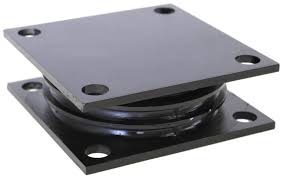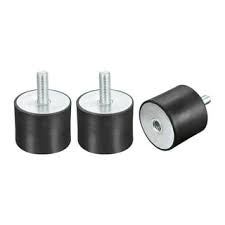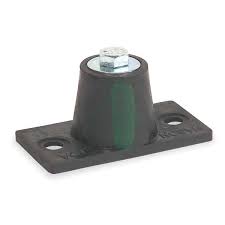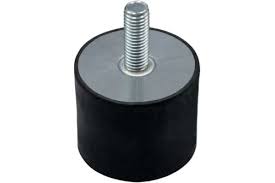Spring Vibration Isolators are an essential tool for mitigating the negative effects of vibrations in various industrial and mechanical applications. These isolators are designed to effectively minimize the transmission of vibrations and shock from machinery, equipment, and structures. In this article, we will explore vibration isolators for pipe the importance of spring vibration isolators and how they can be used to solve vibration issues in a wide range of environments.
Spring vibration isolators are mechanical devices used to reduce or eliminate vibration and noise in a variety of industrial applications. They are designed to support heavy loads while providing isolation from vibrations and shocks. These isolators are commonly used in HVAC systems, heavy machinery, industrial equipment, and other applications where vibration can cause damage or discomfort. The isolators work by using helical springs to support the load and absorb vibration energy. As the load vibrates, the springs flex and compress, effectively isolating the equipment from the vibrations. This helps to reduce noise, improve equipment performance, and extend the lifespan of machinery by minimizing wear and tear caused by vibration. When solving vibration issues with spring vibration isolators, it's important to consider factors such as the weight and type of equipment being supported, the frequency and amplitude of the vibrations, and the environmental conditions of the application. Proper selection and installation of the isolators are crucial to effectively addressing vibration problems. Additionally, regular maintenance and inspection of the isolators is important to ensure their continued effectiveness. Over time, the springs may wear out or lose their elasticity, leading to decreased isolation performance. Checking and replacing worn isolators as needed can help to maintain optimal vibration control. In conclusion, spring vibration isolators are a valuable tool for addressing vibration issues in a variety of industrial applications. By providing effective isolation from vibrations and shocks, they help to reduce noise, protect equipment, and improve overall performance. Proper selection, installation, and maintenance of these hanger mount vibration isolator isolators are essential for successfully solving vibration issues in industrial settings.
Spring vibration isolators are mechanical devices designed to mitigate vibration and noise in various industrial settings. They are employed to support heavyweight loads while isolating them from vibrations and shocks. Essentially, these isolators use helical springs to absorb and dampen vibration energy, thereby reducing noise and minimizing wear and tear on machinery. When addressing vibration issues with spring vibration isolators, it is crucial to evaluate factors such as equipment weight, vibration frequency and amplitude, and environmental conditions. Proper selection and installation of the isolators are key to effectively addressing vibration problems. Regular maintenance and inspection are also important to ensure the isolators continue to perform vibration isolation mounts optimally. Over time, the springs may wear out, impacting the isolator's effectiveness in reducing vibrations. In summary, spring vibration isolators are an effective tool for managing vibration issues in various industrial applications. When correctly selected, installed, and maintained, they can significantly reduce noise, protect equipment, and enhance overall performance in industrial environments.
Understanding the Importance of Spring Vibration Isolators

Spring vibration isolators are crucial for a variety of applications where vibration control is necessary. These isolators are designed to reduce the transmission of vibration and noise from mechanical equipment and systems, thereby preventing damage and improving the performance of machinery. They are commonly used in HVAC systems, industrial machinery, generators, and other equipment that produces vibration. By utilizing spring vibration isolators, the overall lifespan of equipment can be extended, maintenance costs can be reduced, and the safety and comfort of surrounding personnel can be improved. These isolators are capable of absorbing and dissipating energy from vibration, preventing it from transferring to the surrounding structure and causing potential harm. When selecting spring vibration isolators, it is important to consider factors such as load capacity, natural frequency, and environmental conditions in order to ensure proper performance and longevity. Proper installation and maintenance of these isolators are also critical to their effectiveness in controlling vibration and preserving the integrity of equipment and structures.
The Advantages of Using Spring Vibration Isolators in HVAC Systems
hvac vibration isolators residential

Spring vibration isolators are commonly used in HVAC systems to reduce the transmission of vibrations and noise from the equipment to the surrounding structure. These isolators are designed to absorb and dissipate the energy generated by the HVAC equipment, helping to prevent structural damage and reduce noise levels. One of the key advantages of using spring vibration isolators is their ability to effectively isolate and control the vibrations from HVAC equipment, such as chillers, pumps, and air handling units. This can lead to improved comfort for building occupants, as well as reduced wear and tear on the equipment itself. Additionally, spring vibration isolators can help to extend the lifespan of HVAC equipment by reducing the impact of vibrations and minimizing the risk of damage. This can result in lower maintenance and repair costs over time, making spring isolators a cost-effective solution for HVAC systems. Furthermore, spring isolators are relatively easy to install and can be customized to meet the specific needs of different HVAC applications. They are also durable and require minimal maintenance, making them a reliable solution for long-term use. Overall, the use of spring vibration isolators in HVAC systems can provide numerous benefits, including improved comfort, reduced maintenance costs, and extended equipment lifespan. As a result, they are a popular choice for controlling vibrations and noise in a wide range of commercial and industrial HVAC applications.
The Role of Spring Vibration Isolators in Industrial Machinery<
building vibration isolation/h2>

Spring vibration isolators are an essential component in industrial machinery as they help to reduce the transmission of vibration and noise from the equipment to its surrounding environment. They are used to isolate the machinery from the surrounding structure, preventing the transfer of vibration that can lead to structural damage and disruption. These isolators work by absorbing and dissipating the energy generated by the machinery, thereby reducing the level of vibration transmitted to the surrounding environment. This not only helps to protect the structural integrity of the building or structure in which the machinery is installed but also minimizes the impact of noise and vibration on workers and nearby equipment. The use of spring vibration isolators in industrial machinery is critical for maintaining a safe and productive work environment. By effectively reducing vibration and noise transmission, these isolators help to prevent equipment damage, improve worker comfort, and ensure the overall operational efficiency of the machinery. Additionally, they can extend the lifespan of the machinery by minimizing the wear and tear caused by excessive vibration. Overall, the role of spring vibration isolators in industrial machinery is crucial for achieving optimal performance, safety, and longevity of equipment in various industrial settings. These isolators play a vital role in mitigating the negative effects of vibration and noise, making them an indispensable component of industrial machinery systems.
Selecting the Right Spring Vibration Isolators for Automotive Applications

When selecting spring vibration isolators for automotive applications, it is important to consider factors such as the vehicle's weight, the type and frequency of vibrations it will be subject to, and the specific components or systems that need to be isolated. Additionally, the temperature range and environmental conditions in which the isolators will be operating should also be taken into account. It is crucial to choose isolators that are capable of effectively absorbing and dampening vibrations while also providing adequate support for the vehicle. This may involve selecting isolators with the appropriate spring rates, load capacities, and deflection characteristics. Furthermore, the design and installation of the isolators should be such that they do not interfere with the vehicle's overall performance or functionality. It is essential to ensure that the chosen isolators are compatible with the specific automotive application and that they can be integrated seamlessly into the vehicle's design. Ultimately, the right spring vibration isolators for automotive applications will be those that are able to effectively mitigate vibrations, provide support, and withstand the operating conditions they will be exposed to. Thorough consideration of these factors is essential in order to select isolators that will contribute to the overall performance, comfort, and longevity of the vehicle.
The Design and Function of Spring Vibration Isolators
Spring vibration isolators are designed to reduce the transmission of vibration and noise from industrial machinery and equipment. They work by absorbing and dissipating the energy generated by the equipment, thereby preventing it from being transferred to the surrounding structure. These isolators typically consist of a metal spring element encased in a rubber or neoprene material to provide further damping and isolation. The design allows the isolator to flex and move with the equipment, effectively decoupling it from the surrounding structure. This helps to minimize the transfer of vibration and noise, resulting in a quieter and more comfortable working environment. In addition to reducing vibration and noise, spring vibration isolators also help to protect sensitive equipment from damage caused by excessive vibration. They are commonly used in a wide range of applications, including HVAC systems, chillers, pumps, generators, and industrial machinery. Overall, the design and function of spring vibration isolators play a crucial role in maintaining a safe and efficient working environment while prolonging the lifespan of equipment and machinery.
Installation and Maintenance Considerations for Spring Vibration Isolators
Installation and maintenance considerations for spring vibration isolators include ensuring that the isolators are properly sized and specified for the equipment they will support. It is important to carefully follow the manufacturer's guidelines for installation to ensure that the isolators are properly aligned and securely attached to the equipment and supporting structure. Regular maintenance should be scheduled to inspect the isolators for signs of wear or damage, and to ensure that they continue to provide effective vibration isolation. This may include checking for proper preload, inspecting for corrosion or other damage, and replacing any worn components as needed. Proper installation and routine maintenance of spring vibration isolators can help to maximize their effectiveness and prevent premature failure.
The Impact of Spring Vibration Isolators on Noise Reduction
Spring vibration isolators are commonly used to reduce noise and vibration in mechanical systems. When properly designed and installed, these isolators can effectively reduce the transmission of vibration and noise from equipment to the surrounding environment. The main impact of spring vibration isolators on noise reduction is through their ability to isolate the equipment from its mounting structure, effectively decoupling it from the surrounding environment. This isolation minimizes the transmission of vibration and noise, resulting in a quieter and more comfortable working environment for personnel. Additionally, spring vibration isolators can also help prolong the life of equipment by reducing the harmful effects of vibration, such as mechanical fatigue and wear. This can result in cost savings due to decreased maintenance and downtime associated with equipment failure. Overall, the proper selection and implementation of spring vibration isolators can have a significant impact on noise reduction in industrial and commercial settings, leading to a more comfortable and productive work environment while also preserving the lifespan of equipment.
The Future of Spring Vibration Isolators in Advanced Engineering Solutions
The future of spring vibration isolators in advanced engineering solutions is promising. These isolators are important for minimizing vibration in various applications such as industrial machinery, vehicle suspension systems, and building structures. As technology advances, there is a growing need for more efficient and effective vibration isolation solutions. In the future, we can expect to see advancements in material technology to improve the performance and durability of spring isolators. This may involve the development of new materials with enhanced damping and vibration absorption properties. Additionally, there will likely be an increased focus on the use of advanced modeling and simulation techniques to optimize the design of spring isolators for specific applications. Furthermore, as the demand for precision engineering continues to grow, spring isolators are likely to play a critical role in ensuring the smooth and stable operation of sensitive equipment and machinery. This will drive the need for innovative and specialized solutions tailored to specific industry requirements. Overall, the future of spring vibration isolators in advanced engineering solutions is characterized by continuous innovation and improvement to meet the evolving demands of modern technology and industry.
In conclusion, spring vibration isolators are an effective solution for addressing and solving vibration issues in various equipment and machinery. By providing a cushioning effect and absorbing vibrations, spring isolators help to improve equipment performance, reduce noise, and extend the lifespan of machinery. With their versatility and effectiveness, spring vibration isolators are a valuable tool for maintaining a smooth and efficient operation.
See also
https://www.lanpdt.com/vibration-isolation/ https://www.heliwigcarbon.com/products/vibration-isolators/ https://www.shakeabsorb.com/products/vibration-isolators/